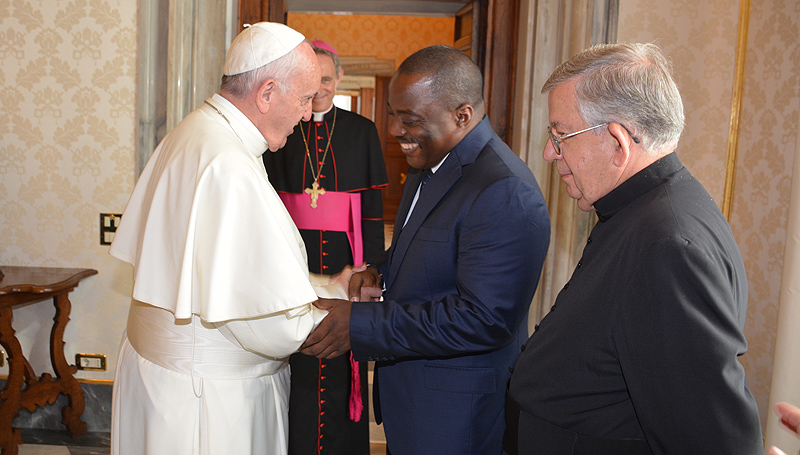
Kinshasa, DR Congo | AFP |
Talks on defusing an explosive crisis in Democratic Republic of Congo (DRC) resumed Wednesday, a day after bloody clashes, as the Catholic church appealed for a deal by Christmas over the future of President Joseph Kabila.
The call by bishops sponsoring talks between the opposition and ruling party came after protests erupted over Kabila’s refusal to step down at the end of his mandate.
According to a UN provisional toll, 19 people were killed and 45 hurt in violence across DRC on Tuesday, the day Kabila’s second and final scheduled term ran out.
The government put the toll at 11 dead, nine in Kinshasa and two in the second city Lubumbashi.
The expiry of Kabila’s term was met without any plan for a political transition, with no election in sight.
Tensions remained high on Wednesday, with activity resuming slowly in Kinshasa, a megacity of 10 million people, and with soldiers and police posted at major crossroads.
In Masina, a neighbourhood in the south of the capital, calm had returned “but tension remains in the background,” said a local community leader.
All eyes were on the resumption of the talks headed by the Episcopal Conference, CENCO, which had broken up at the weekend with no progress.
“Our wish is to end before Christmas,” said CENCO chairman Monsignor Marcel Utembi. “If the political and civil society actors do not reach a compromise by then… CENCO will draw the consequences.”
UN Secretary-General Ban Ki-moon on Wednesday urged the government and opposition to work constructively to reach a deal.
Ban deplored the loss of life and urged all parties to “work constructively and in good faith on the outstanding issues related to transitional arrangements leading to the elections,” said a statement from his spokesman which backed the CENCO-facilitated dialogue.
– ‘Peaceful resistance’ –
In Rome, Pope Francis too appealed to the Congolese people to be “artisans of peace”.
Gunfire rang out across the vast and troubled nation as the protests erupted Tuesday.
In Lubumbashi, governor Jean-Claude Kazembe had to turn back as he attempted to visit the scene of Tuesday’s violence when he was targeted by stone-throwing protesters.
So far the mainstream opposition has called for “peaceful resistance” from the country’s 70 million people, pinning its hopes on a deal at the negotiating table.
But in what Kabila’s opponents dubbed a provocation, a new government was announced overnight Monday, headed by Samy Badibanga.
The freshly appointed cabinet is part of an October deal struck between the ruling party and tiny fringe opposition groups enabling Kabila to remain in office pending elections in April 2018.
– Wave of arrests –
The main opposition bloc headed by 84-year-old Etienne Tshisekedi rejects the plan. It wants elections next year — along with a pledge that Kabila will not stand.
Maman Sambo Sidikou, the head of the UN mission in Congo, had voiced alarm on Tuesday about a wave of arrests of opposition leaders, rights campaigners and journalists since December 16.
Kabila, 45, who has ruled since 2001, is constitutionally barred from seeking a third term but under a controversial recent constitutional court order, he may stay on until a successor is chosen.
In a YouTube video, Tshisekedi launched “a solemn appeal to the Congolese people to no longer recognise the authority of Mr. Joseph Kabila, to the international community to no longer deal with Joseph Kabila in the name of the Democratic Republic of Congo”.
He urged people “to peacefully resist the coup d’etat”.
The message was not available in DRC, where authorities have since Sunday imposed strict controls on social media networks.
DRC has never witnessed a democratic transfer of power following polls since independence from Belgium in 1960.
The president has been in office since his father Laurent Kabila’s assassination in 2001. He was elected in 2006, and again in 2011.
Two decades ago, the country collapsed into the deadliest conflict in modern African history. Its two wars in the late 1990s and early 2000s dragged in at least six African armies and left more than three million dead.
 The Independent Uganda: You get the Truth we Pay the Price
The Independent Uganda: You get the Truth we Pay the Price



